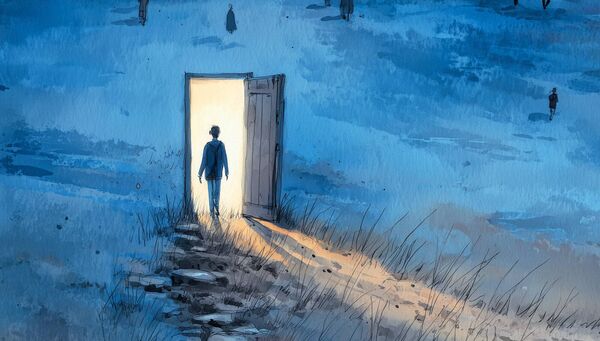The glorious indifference of middle age

Choosing to walk away from toxic company isn't isolation - it's liberation. Illustration: Conor McGuire
If you are of a certain vintage, you may have had a realisation, probably somewhere between your first pair of reading glasses and the unsettling knowledge that the last crop of Gardaí look like schoolboys, when you stop giving a damn what anyone thinks of you. It arrives without fanfare - no trumpets, no epiphany, just a gradual and welcome evaporation of concern. With unexpected relief, you happily take note that the opinion of others, which once pressed upon you like a Victorian corset, has loosened its grip entirely and you can breathe freely.
This is not the aggressive 'I don't care what you think' posturing of youth, which is really just caring desperately while pretending not to. This shift in consciousness is something altogether quieter and more profound, it's an almost spiritual indifference. The detachment of spirit that lets you wear comfortable but tattered shoes or wear an unfashionable knitted jumper because you genuinely prefer how it feels. It's immunity, not insurrection.
We Irish have a complicated relationship with this particular form of liberation. Despite our cultural renaissance and legendary economic success, we remain a nation of chronic approval-seekers, especially when it comes to our approval ratings across the Atlantic. We swoon at American celebrity and political endorsements, glowing with misplaced pride when they mutter their flattering and plainly condescending platitudes. It's become woven into our social DNA, that peculiarly Irish cocktail of neediness and rebellion, kept in check by a barely concealed begrudgery.
Which makes the freedom that arrives with age all the sweeter. It's like being released from a prison you didn't know you were in. Suddenly, you can say the quiet thing out loud. You can admit that you find most contemporary art pretentious rubbish, or that you quite liked that politician everyone's supposed to hate, or that you're bored rigid by RTÉ and its tedious presenters. The sky doesn't fall in. The earth doesn't swallow you whole. People might disapprove, but here's the revelation: their disapproval can't actually hurt you anymore.
There's research behind this phenomenon. American scholars studying what they call "collective illusions" have discovered something both obvious and profound. We all privately hold opinions we're too terrified to voice, believing ourselves to be alone in thinking them, when in fact huge numbers of other people think exactly the same thing but are staying equally quiet. It's a conspiracy of cowardice, really. Everyone is pretending to believe something they don't, creating a false consensus that nobody actually agrees with.

The data is stark. Nearly 60% of Americans believe that most people can't share honest opinions on sensitive topics anymore. Some 61% admit to self-silencing. And when researchers ask people what they publicly support versus what they privately believe, the gaps are astonishing. Young people who publicly champion certain progressive policies? Privately, they're sceptical in numbers identical to those of their grandparents. People who say society is fair turn out to think it's anything but when nobody's listening. We're all performing opinions we don't hold, creating a theatre of fake agreement.
The Soviets, naturally, perfected this as the entire apparatus of totalitarianism ran on it - not tanks and secret police, though they helped, but on everyone pretending to support a system they privately loathed. The genius was making people think they were the only ones who saw through it all. Lonely dissent is easily crushed; shared dissent topples empires. When Russian dissidents finally helped people realise that hating the system was actually the majority view, the whole thing collapsed. Not with a bang but a whimper - once everyone knew everyone else had been faking it, the jig was up.
We're not living under Soviet tyranny, obviously. Nobody's going to ship you to a gulag for unpopular opinions, but we've created our own genteel version of groupthink. Our own polite totalitarianism, where certain views are simply not done. Where you nod along, murmuring agreement about things you privately find absurd, because social death feels more terrifying than self-betrayal.
And it does kill something, this constant self-censorship. That gap between what you think and what you say - between your private truth and your public performance - it corrodes you from the inside. Makes you feel like a fraud. Which you are, technically. You're lying, just with better manners and a nicer accent than your average liar. Emerson called it "lying hospitality", this business of pretending agreement for the sake of social harmony. Polite mendacity. We Irish have turned it into a high art.
The psychological toll is measurable. Researchers have found that saying one thing while believing another creates genuine cognitive dissonance - the mental equivalent of trying to walk in shoes two sizes too small. You can do it, but why should you? This dissonance is linked to social anxiety, depressive symptoms, and feelings of inadequacy. It's self enforced double think: forcing yourself to hold two contradictory positions simultaneously, one thought and one stated, until you're not sure which is real anymore.
But here's what changes when you hit a certain age: you stop caring whether you're invited to the party at all. The relief of not performing becomes infinitely preferable to the exhausting charade of fitting in. When you're young, you need the tribe. Evolution wired us that way- social isolation meant death on the savannah, so our brains treat disagreement with the group like mortal danger. But somewhere in your fifties, that wiring starts to fray. Maybe it's hormones. Maybe it's having survived enough contradictions to know it won't kill you. Maybe it's just being too tired to pretend anymore.
And here's the part you only learn through practice: choosing to walk away from toxic company isn't isolation - it's liberation. There comes a point where you acknowledge that certain people, certain circles, certain relationships are draining the life from you precisely because they demand this constant pretence. Why silence yourself and edit your thoughts, presenting an acceptable version of who you are when you have realised that you no longer have to be there anymore?
As an adult, you don't need to storm off with your middle finger raised or issue dramatic declarations or burn bridges. Instead, quietly withdraw your attention and energy. Stop listening to the nonsense and showing up for the performances. The people who love you for who you actually are will remain, while the others were never really there for you anyway - they were there because you fit into their preferred cast of characters. Let them audition another actor.
This isn't bitterness or antisocial behavior but discernment, finally understanding that solitude isn't punishment and it's perhaps the most honest company you'll find. Better to enjoy solitude with your integrity intact than surrounded by people who require you to check yourself at the door.
When we collectively self-censor, when we all perform opinions we don't hold, we somehow poison the well. So, here's the prescription: make a list of things you privately believe but don't say out loud. Things you pretend to agree with but actually think are rubbish. They won't be hard to find - every demographic group seems to be at it. Then, quietly, start telling the truth. Not aggressively. Not with manifestos or social media rants. Just honestly, calmly, stating what you actually think.
You might find you're not alone at all. That the emperor everyone's been admiring is as naked as you suspected. Or you might discover you genuinely are in the minority, and you'll walk alone. Either way, at least you'll be walking in your own shoes.
The unexpected joy of middle age isn't wisdom or serenity or any of that greeting-card nonsense. It's more straightforward and more profound: it's finally becoming immune to the opinions of others, good or bad. It's the liberty of not lying anymore, even politely. It's discovering that the worst thing that can happen when you speak your truth is that some people won't like you - and realising, with profound relief, that you don't actually care.




